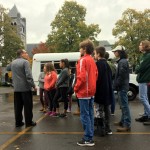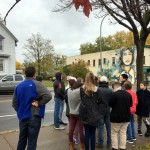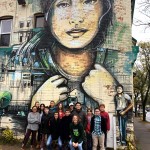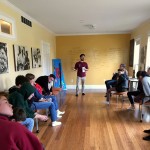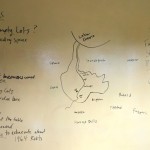Community Engagement Outing: July ‘64 Tour — by Jocie Kopfman and Lars Kuelling
On a rainy Friday, November 3rd, the Trimester I Rights & Responsibilities class (required for all 9th graders) took a trip to downtown Rochester to hear first-hand memories of the July 1964 race rebellion and gain context for those events. After visiting Joseph Avenue, they ate lunch at El Pilon Criollo, then finished the trip with a workshop at the Gandhi Institute for Nonviolence.
Below is a write-up of the class trip:
The purpose of this trip is to better inform us about the strengths and challenges of our collective community, Rochester, and get us thinking about how we, personally, can make positive change.
We begin by reviewing the history of Rochester through the lens of the race rebellion of 1964. Luis Perez, a local leader in Rochester who experienced the rebellion at the age of eight, will take us on a tour of Joseph Avenue, the street where the race rebellion of July ’64 took place and show us several organizations that were created in response to the rebellion. The goal is to understand the immediate impact the rebellion had and how it continues to impact us today.
We will stop for lunch at El Pilon Criollo, a local Caribbean restaurant in the city.
Finally, we will stop at the Gandhi Institute for Nonviolence, a local nonprofit activist group, to participate in a workshop that helps us digest the tour and consider the role we want to play in seeking solutions toward positive change around topics that are important to us.
———————————————————————————————————————
Luis Perez- Director of program Support and Expansion for Greater Rochester Summer Learning Association (GRSLA). Luis also worked as the Executive Director of Horizon at Harley for 6 years.
The Gandhi Institute Mission:
The M.K. Gandhi Institute for Nonviolence is a nonprofit that equips people to use nonviolence to create a sustainable and just world for all. The M.K. Gandhi Institute collaborates with local organizations, academic institutions, students, and committed peacemakers in the following areas: nonviolence education, sustainability and environmental conservation, and the promotion of racial justice. We prioritize programming for people between the ages of 12 and 24 as well as those who serve those age groups.
The Institute continuously offers groups and individuals training in skills such as Nonviolent Communication, meditation and experiential interconnectedness, and fosters responses to systemic violence in the Rochester area through projects focused on urban agriculture, racial healing work and restorative approaches to conflict. // The Institute maintains a collection of books, videos, and recordings which cover the lives and legacies of Mahatma Gandhi, Martin Luther King, Jr., and other important social activists. These materials are available for use by those seeking to learn more about such topics. By serving as a physical manifestation of Gandhian principles and Martin Luther King’s Beloved Community, the Gandhi Institute seeks to advance the cause of peacemaking regionally and beyond from within a neighborhood challenged by poverty and violence.
